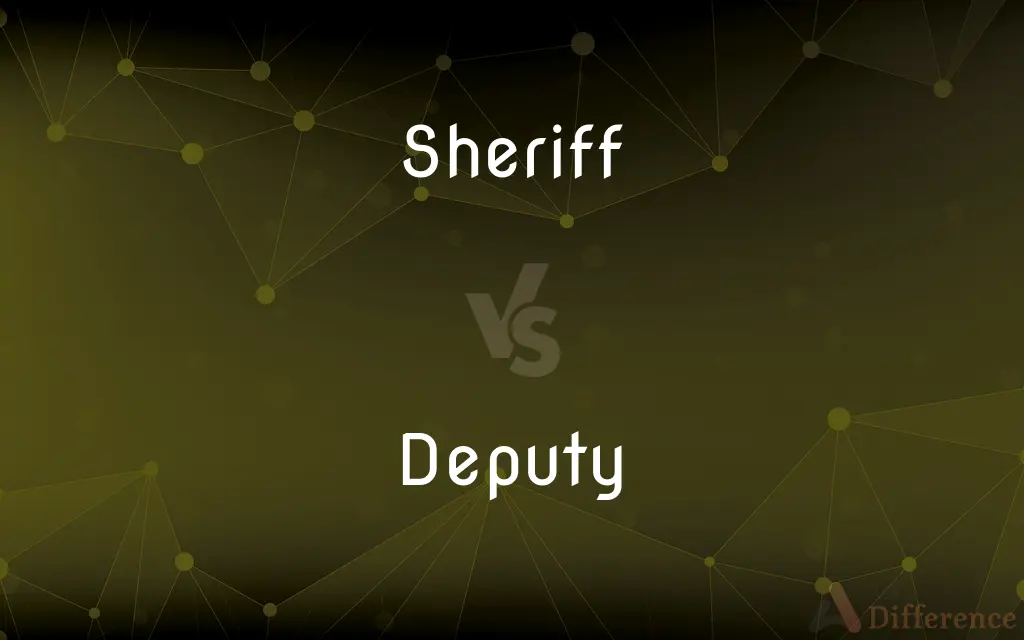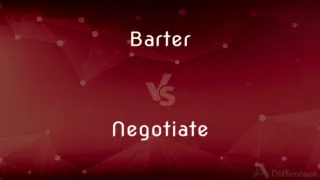Sheriff vs. Deputy — What's the Difference?
Edited by Tayyaba Rehman — By Maham Liaqat — Updated on April 27, 2024
A sheriff is an elected official responsible for law enforcement in a county, while a deputy is appointed by the sheriff to assist with duties and law enforcement tasks.

Difference Between Sheriff and Deputy
Table of Contents
ADVERTISEMENT
Key Differences
The sheriff is the highest law enforcement officer in a county, elected by the public to oversee all policing activities. They are responsible for maintaining order, enforcing laws, and managing the county jail. On the other hand, deputies are appointed by the sheriff and serve under their command, performing policing duties as assigned.
Sheriffs typically have a broad range of responsibilities that include administrative tasks, policymaking, and high-level supervisory duties. Whereas deputies focus primarily on direct law enforcement activities such as patrolling, investigating crimes, and arresting suspects.
In terms of authority, sheriffs have jurisdiction over the entire county and can make executive decisions regarding law enforcement policies and operations. Conversely, deputies have authority delegated by the sheriff and generally do not engage in policymaking or administrative roles.
Sheriffs often engage in public relations and community interaction, representing the county's law enforcement on a political and social level. Deputies, while they may interact with the community, primarily focus on enforcement and day-to-day operational duties.
While both sheriffs and deputies are sworn law enforcement officers, the role of a sheriff is a political position requiring election by the public. This contrasts with deputies, who are typically hired through a standard employment process and are not elected.
ADVERTISEMENT
Comparison Chart
Position Type
Elected official
Appointed employee
Primary Responsibilities
Oversight of entire county law enforcement, jail management, administrative and policymaking duties
Direct law enforcement duties such as patrolling and investigating
Authority Level
Full jurisdiction over county, can make executive decisions
Authority delegated by sheriff, limited to specific duties
Community Interaction
High-level representation, involved in public relations
Direct interaction primarily through enforcement activities
Appointment
Elected by the public to serve a specific term
Appointed by the sheriff without need for public election
Compare with Definitions
Sheriff
Elected by county residents.
The sheriff campaigned on increasing transparency within the department.
Deputy
Carries out patrols and investigations.
The deputy investigated a series of burglaries in the county.
Sheriff
Manages the county jail.
The sheriff introduced rehabilitation programs for inmates.
Deputy
Works under the sheriff’s direction.
The deputy coordinated with other agencies as directed by the sheriff.
Sheriff
Responsible for county-wide law enforcement.
The sheriff implemented new policies to reduce crime rates.
Deputy
Appointed by the sheriff.
The new deputy was appointed after a rigorous selection process.
Sheriff
Chief law enforcement officer of a county.
The sheriff organized a town hall to discuss community safety.
Deputy
Handles day-to-day law enforcement tasks.
The deputy conducted traffic stops to enforce road safety.
Sheriff
Represents the law enforcement in county government.
The sheriff attended the county budget meeting to advocate for more funds.
Deputy
Assists the sheriff in law enforcement duties.
The deputy responded to emergency calls overnight.
Sheriff
A sheriff is a government official, with varying duties, existing in some countries with historical ties to England where the office originated. There is an analogous although independently developed office in Iceland that is commonly translated to English as sheriff, and this is discussed below.
Deputy
A person who is appointed or empowered to act for another.
Sheriff
A public officer in the United States with responsibility for certain law enforcement and administrative legal duties, such as making arrests and serving processes, usually for a particular county.
Deputy
An assistant exercising full authority in the absence of their superior and exercising equal authority in emergencies
A deputy to the sheriff.
Sheriff
A public officer in various other countries performing certain law enforcement, judicial, or ceremonial functions.
Deputy
A representative in a legislative body in certain countries.
Sheriff
(High Sheriff) An official of a shire or county office, responsible for carrying out court orders, law enforcement and other duties.
Deputy
One appointed as the substitute of others, and empowered to act for them, in their name or their behalf; a substitute in office.
The deputy of a prince
The deputy sheriff was promoted after his senior retired.
As the deputy store manager, he is able to fire staff.
Sheriff
(Scotland) A judge in the sheriff court, the court of a county or sheriffdom.
Deputy
A person employed to install and remove props, brattices, etc. and to clear gas, for the safety of the miners.
Sheriff
(US) A government official, usually responsible for law enforcement in their county and for administration of the county jail, sometimes an officer of the court, usually elected.
Deputy
(France) A member of the Chamber of Deputies, formerly called Corps Législatif.
Sheriff
To carry out the duties of a sheriff
Deputy
(Ireland) a member of Dáil Éireann, or the title of a member of Dáil Éireann. (Normally capitalised in both cases).
Eamon Ryan is a deputy in the Dáil.
At today's meeting, Deputy Ryan will speak on local issues.
Sheriff
The chief officer of a shire or county, to whom is intrusted the execution of the laws, the serving of judicial writs and processes, and the preservation of the peace.
Deputy
(US) a law enforcement officer who works for the county sheriff's office; a deputy sheriff or sheriff's deputy; the entry level rank in such an agency.
The sheriff's deputies took the suspect into custody.
Deputy Jones was promoted to corporal today.
Sheriff
The principal law-enforcement officer in a county
Deputy
To deputise
Deputy
One appointed as the substitute of another, and empowered to act for him, in his name or his behalf; a substitute in office; a lieutenant; a representative; a delegate; a vicegerent; as, the deputy of a prince, of a sheriff, of a township, etc.
There was then [in the days of Jehoshaphat] no king in Edom; a deputy was king.
God's substitute,His deputy anointed in His sight.
Deputy
A member of the Chamber of Deputies.
Deputy
Someone authorized to exercise the powers of sheriff in emergencies
Deputy
An assistant with power to act when his superior is absent
Deputy
A member of the lower chamber of a legislative assembly (such as in France)
Deputy
A person appointed to represent or act on behalf of others
Common Curiosities
Do sheriffs personally patrol the streets?
While they have the authority to patrol, sheriffs generally focus on administrative duties and may not regularly patrol.
Can a deputy make arrests?
Yes, deputies have the authority to make arrests and perform other law enforcement duties as needed.
What qualifications are required to be a sheriff?
Requirements vary, but generally include law enforcement experience, residency in the county, and reaching a minimum age.
What happens if a sheriff cannot complete their term?
Procedures vary, but typically a deputy or another appointed official may act as sheriff until a new election can be held.
How is a sheriff different from a police chief?
A sheriff is elected and has county-wide authority, while a police chief is typically appointed and responsible for a specific city or town.
Is there a limit to how many times a sheriff can be re-elected?
This depends on the local laws; some areas may have term limits, while others do not.
How long does a sheriff serve?
The term length can vary by state or county, typically ranging from two to four years.
Can a deputy become a sheriff?
Deputies can run for sheriff if they meet the election criteria and are elected by the public.
Do deputies have any administrative responsibilities?
While primarily focused on operational tasks, deputies may take on administrative duties, especially in smaller departments.
How does a deputy get promoted?
Promotion processes vary by department but generally involve assessments, experience, and sometimes additional training or education.
Can a sheriff be removed from office?
Yes, sheriffs can be removed through legal processes such as impeachment or recall elections, depending on the local laws.
Are deputies involved in jail operations?
Yes, deputies may be involved in jail operations, especially in smaller counties where the sheriff’s office manages the jail.
How do sheriffs and deputies collaborate during emergencies?
They work together to manage emergency responses, with deputies typically handling frontline tasks and sheriffs overseeing and coordinating efforts.
Do sheriffs and deputies have different training?
Both receive law enforcement training, though sheriffs may also receive additional training related to administrative and leadership roles.
Can sheriffs enact new laws?
Sheriffs cannot enact laws but can develop policies and procedures for their departments.
Share Your Discovery

Previous Comparison
Barter vs. Negotiate
Next Comparison
Mooli vs. DaikonAuthor Spotlight
Written by
Maham LiaqatEdited by
Tayyaba RehmanTayyaba Rehman is a distinguished writer, currently serving as a primary contributor to askdifference.com. As a researcher in semantics and etymology, Tayyaba's passion for the complexity of languages and their distinctions has found a perfect home on the platform. Tayyaba delves into the intricacies of language, distinguishing between commonly confused words and phrases, thereby providing clarity for readers worldwide.
















































